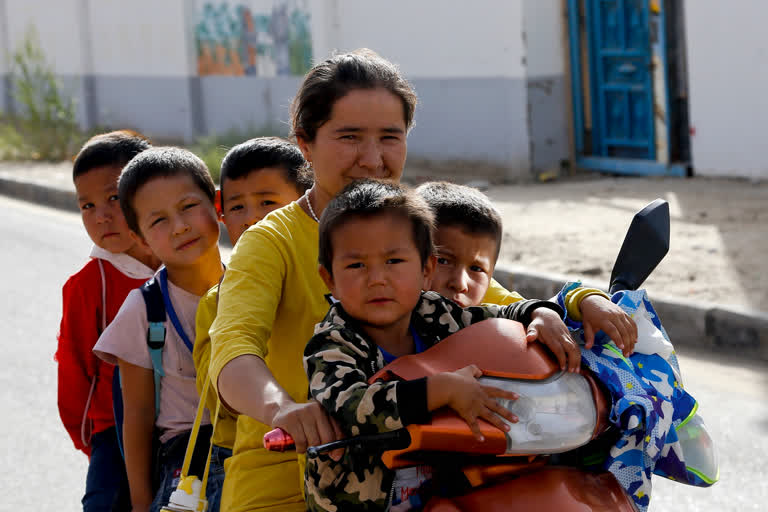Beijing:The Chinese government is taking draconian measures to slash birth rates among Uighurs and other minorities as part of a sweeping campaign to curb its Muslim population, even as it encourages some of the country’s Han majority to have more children.
While individual women have spoken out before about forced birth control, the practice is far more widespread and systematic than previously known, according to an investigation based on government statistics, state documents and interviews with 30 ex-detainees, family members and a former detention camp instructor. The campaign over the past four years in the far west region of Xinjiang is leading to what some experts are calling a form of demographic genocide.
The state regularly subjects minority women to pregnancy checks and forces intrauterine devices, sterilization and even abortion on hundreds of thousands, the interviews and data show. Even while the use of IUDs and sterilization has fallen nationwide, it is rising sharply in Xinjiang.
The population control measures are backed by mass detention both as a threat and as a punishment for failure to comply. Having too many children is a major reason people are sent to detention camps with the parents of three or more ripped away from their families unless they can pay huge fines. Police raid homes, terrifying parents as they search for hidden children.
Read |BLA behind PSX attack: Know Balochistan Liberation Army
After Gulnar Omirzakh, a Chinese-born Kazakh had her third child, the government ordered her to get an IUD inserted. Two years later, in January 2018, four officials in military camouflage came knocking at her door anyway. They gave Omirzakh, the penniless wife of a detained vegetable trader, three days to pay a $2,685 fine for having more than two children.
If she didn’t, they warned, she would join her husband and a million other ethnic minorities locked up in internment camps ¬— often for having too many children.
“God bequeaths children on you. To prevent people from having children is wrong,” said Omirzakh, who tears up even now thinking back to that day. “They want to destroy us as a people.”
Read |Beyond 'love,' Trump has little to show from N Korea talks
The result of the birth control campaign is a climate of terror around having children, as seen in an interview after the interview. Birth rates in the mostly Uighur regions of Hotan and Kashgar plunged by more than 60% from 2015 to 2018, the latest year available in government statistics. Across the Xinjiang region, birth rates continue to plummet, falling nearly 24% last year alone — compared to just 4.2% nationwide, statistics show.
The hundreds of millions of dollars the government pours into birth control has transformed Xinjiang from one of China’s fastest-growing regions to among its slowest in just a few years, according to new research in advance of publication by China scholar Adrian Zenz.
“This kind of drop is unprecedented...there's a ruthlessness to it,” said Zenz, a leading expert in the policing of China's minority regions. “This is part of a wider control campaign to subjugate the Uighurs.”
The Chinese Foreign Ministry referred to multiple requests for comment to the Xinjiang government, which did not respond. However, Chinese officials have said in the past that the new measures are merely meant to be fair, allowing both Han Chinese and ethnic minorities the same number of children.
For decades, China had one of the most extensive systems of minority entitlements in the world, with Uighurs and others getting more points on college entrance exams, hiring quotas for government posts and laxer birth control restrictions. Under China’s now-abandoned ‘one-child’ policy, the authorities had long encouraged, often forced, contraceptives, sterilization and abortion on Han Chinese. But minorities were allowed two children — three if they came from the countryside.
Under President Xi Jinping, China’s most authoritarian leader in decades, those benefits are now being rolled back. In 2014, soon after Xi visited Xinjiang, the region’s top official said it was time to implement equal family planning policies” for all ethnicities and “reduce and stabilize birth rates. In the following years, the government declared that instead of just one child, Han Chinese could now have two, and three in Xinjiang's rural areas, just like minorities.
But while equal on paper, in practice Han Chinese are largely spared the abortions, sterilizations, IUD insertions and detentions for having too many children that are forced on Xinjiang’s other ethnicities. Some rural Muslims, like Omirzakh, are punished even for having the three children allowed by the law.
State-backed scholars have warned for years that large rural religious families were at the root of bombings, knifings and other attacks the Xinjiang government blamed on Islamic terrorists. The growing Muslim population was a breeding ground for poverty and extremism, heightening political risk, according to a 2017 paper by the head of the Institute of Sociology at the Xinjiang Academy of Social Sciences. Another cited as a key obstacle to the religious belief that the fetus is a gift from God.
Outside experts say the birth control campaign is part of a state-orchestrated assault on the Uighurs to purge them of their faith and identity and forcibly assimilate them into the dominant Han Chinese culture. They’re subjected to political and religious re-education in camps and forced labor in factories, while their children are indoctrinated in orphanages. Uighurs, who are often but not always Muslim, are also tracked by a vast digital surveillance apparatus.
“The intention may not be to fully eliminate the Uighur population, but it will sharply diminish their vitality, making them easier to assimilate,” said Darren Byler, an expert on Uighurs at the University of Colorado.
“It's genocide, full stop. It’s not immediate, shocking, mass-killing on the spot type genocide, but it’s slow, painful creeping genocide,” said Joanne Smith Finley, who works at Newcastle University in the UK. “These are the direct means of genetically reducing the Uighur population.”
(AP)
